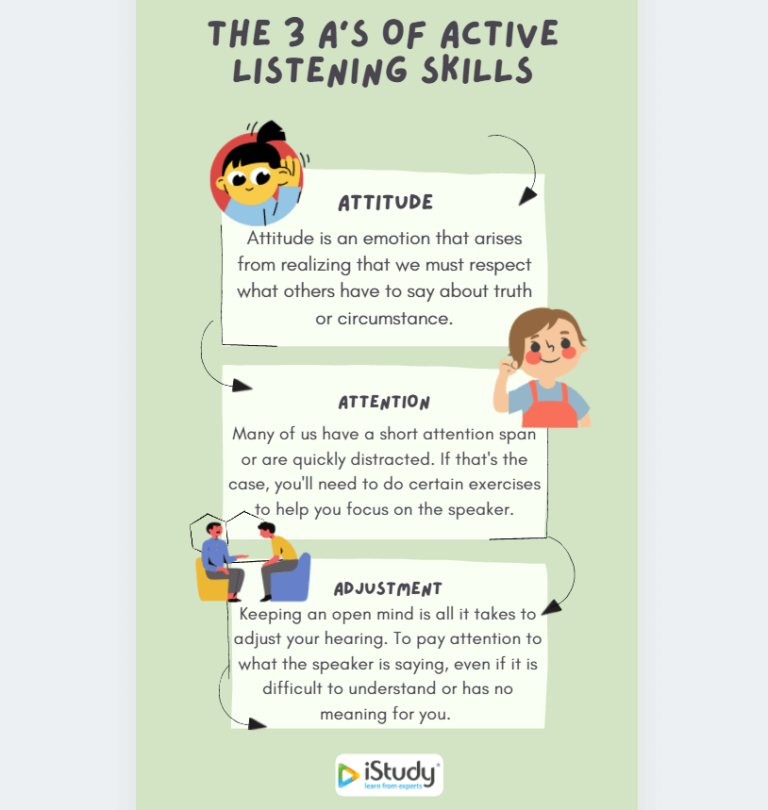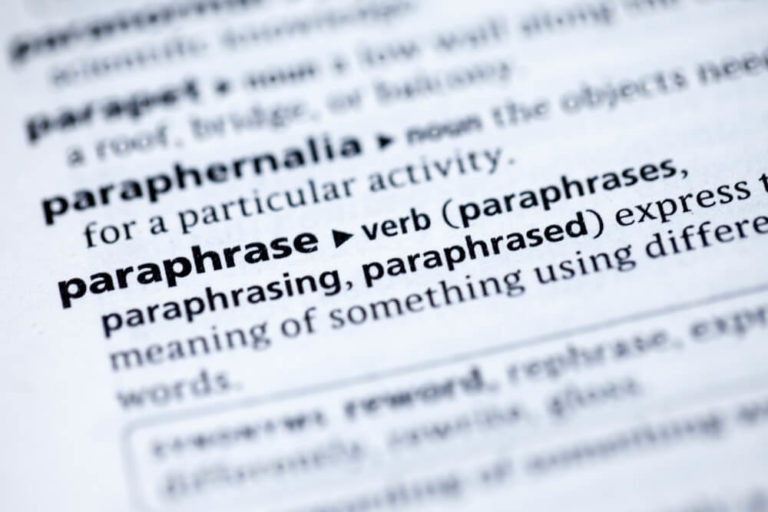
How much of a good listener you are affects the nature of your relationship with your family and colleagues. Unfortunately, research has shown that most of us are terrible at nurturing active listening skills. For instance, Edgar Dale’s “Cone of Experience” described that humankind could only retain 25- 50% of the information expressed in a conversation.
It means, when you are listening to your boss or client give an important business presentation, chances are you are only paying attention to less than half of it. Of course, you might be hoping it is enough. But what if you miss out on crucial information because of not utilising your active listening skills? To save yourself from the embarrassment, better become an active listener!
Table of Content
- What are Active Listening Skills?
- The 3 A’s of Active Listening Skills
- 7 Important Active Listening Skills & Techniques
- More Active Listening Skills
What are Active Listening Skills?
Genuine active listening skills help build relationships, ensure understanding, resolve conflict and improve accuracy. In addition, active listening skills build friendships and careers. The ability to focus totally on a speaker, absorb their message, comprehend the information, and answer thoughtfully is known as active listening.

In contrast, passive listening is the act of hearing a speaker but not remembering what they said. Finally, active listening skills are highly regarded interpersonal communication ability. These ensure that you can engage and recall specific details without having to repeat information.
Consequently, active listeners utilise both verbal and non-verbal cues to demonstrate and maintain their focus on the speaker. It aids your capacity to concentrate and ensures that the speaker sees you are focused and interested.
The 3 A’s of Active Listening Skills
To become a better listener, one must practise the 3 A’s of active listening skills. You have to sincerely understand the dos and don’ts of listening and act accordingly.

Attitude
Attitude is an emotion that arises from realising that we must respect what others have to say about truth or circumstance. Also, remember that we may all learn something new from others, even if we have strong ideas or feelings about the subject at hand. We tend to look beyond our previous views and become better listeners when we appreciate everyone.
Attention
We must pay close attention to be a good listener. However, saying it is easier than doing it. Many of us have a short attention span or are quickly distracted. If that’s the case, you’ll need to do specific exercises to help you focus on the speaker.
To begin, try mind games or puzzles that maintain your focus. Another way that helps us maintain our focus and full attention is meditation.
Adjustment
Keeping an open mind is all it takes to adjust your hearing. To pay attention to what the speaker is saying, even if it is difficult to understand or has no meaning for you. Moreover, we frequently hear exceptional leaders talk about business or life in general.
When the topic of conversation becomes tedious, we tend to daydream rather than adjust. However, we need to adjust to the circumstance. In the end, we become better listeners when we retain an open mind and are willing to spend our time.
7 Important Active Listening Skills & Techniques
Active listening skills are essential regardless of whichever business settings you see yourself working in. Whether you are a sales manager or CEO of a large conglomerate, people need to feel heard when they talk to you.
Moreover, while engaging your active listening skills, pay close attention to the speaker’s body language. It will assist in better comprehension of the message. To better develop your active listening skills, take up these seven important techniques. Then, practice them every day for the workplace and personal life success.
1. Be Attentive
2. Ask Open-Ended Questions
3. Request Clarification
4. Paraphrase
5. Be Receptive to and Reflect Feelings
6. Summarise
7. Share
Be Attentive
The key trait of an active listener is that they give undivided attention to the speaker. Therefore, you need to acknowledge the message and show the speaker that non-verbal engagement is present.

Look at the speaker directly and put aside distracting thoughts while listening to their speech. Furthermore, do not interrupt the speaker mid-sentence. You can formulate your response moments before they finish speaking.
Ask Open-Ended Questions
Ask questions that show you’ve got the gist of what they’ve said. Consequently, please encourage them to offer further details. Make sure you don’t answer these questions with a simple “yes” or “no.”

For instance, ask your sales manager what measures he would like to take up to boost sales revenue. However, please don’t ask them questions like whether they tried incorporating social media into their sales campaign or not. It gets them to think you are pitching ideas for them to work on. And it will leave you with very little feedback to work on.
Open-ended, clarifying, and probing questions are effective active listening strategies. Because they enable the listener to undertake the work of self-reflection and problem-solving. In contrast, you don’t need to explain or defend a position or guess the “right answer.”
Request Clarification
Always clarify instructions and messages in task settings, whether at work or home. It will ensure that you comprehend them correctly. And there will be no room for mistakes during task completion.

However, wait for the speaker to pause to ask your clarifying questions. Do not ask questions that are entirely off-topic or stirs the conversation in a different direction. So, try to ask relevant questions to ensure understanding further. Also, it allows the speaker to further expand on a point as necessary.
Paraphrase
Using different words to reflect what the speaker has stated is known as paraphrasing. Paraphrasing demonstrates that you are listening attentively. Consequently, you are also seeking to comprehend what the speaker is saying.

People frequently “hear what they expect to hear” due to assumptions, stereotypes, or prejudices. When paraphrasing, you mustn’t inject your own opinions or question the speaker’s thoughts, feelings, or actions. Your comments should be non-judgemental and non-directive.
It can be tough to resist the need to ask questions. And when using this strategy for the first time, it can appear awkward and unnatural. Therefore, you should put in some time to practice this active listening skill to feel more comfortable.
Be Receptive to and Reflect Feelings
Give the speaker feedback frequently to keep them interested. Being tuned is one of the crucial active listening skills.
You can’t stand or sit still like a robot while listening to the speaker, which can confuse them. They might even assume you are not tuned into the conversation. Hence, you can use your body language to indicate your thoughts and feelings.

Moreover, you can react with a slight ‘nodding’ or ‘uh-huh’ on occasion. Pose inquiries that are relevant to the situation. Send your feedback to the speaker at work to clear up any misunderstandings and keep the conversation open.
The idea behind providing feedback is to let your speaker know that you are following their thoughts in training. Moreover, try to feel what the speaker is feeling. Because being empathetic is the heart and soul of being a good listener. Conveying mutual feelings with the speaker through facial expressions makes you an effective listener.
Summarise
As the conversation progresses, reiterating significant themes confirms and deepens your understanding of the other person’s point of view.

It also makes it easier for both parties to understand their joint duties and follow-up. While practising active listening, summarise what you’ve learned and ask the other person to do the same.
Share
Last on the list of active listening skills is sharing. Understanding the other person comes first, followed by understanding yourself as a listener. Then, you can begin to introduce your ideas, feelings, and suggestions. First, however, you need to develop a better grasp of the other person’s point of view.
You might relate a comparable experience you’ve had or share an idea sparked by a previous comment in the conversation. Then, communicate with the speaker through the scenario in this fashion.

Afterwards, you and the speaker will have a decent idea of where things stand. The conversation can then transition to problem-solving mode. You guys can brainstorm for solutions. Ask them what haven’t they tried yet? What do they not understand? Moreover, what new techniques are possible?
Continue to question, advise, and instruct the listener. However, do not provide an immediate solution. Because the speaker may feel like they are mouth fed, which is not suitable for their morale, finding a solution on their own will make the speaker feel more confident.
More Active Listening Skills
We listen to learn, understand, enjoy and obtain information. You’d think active listening skills would come naturally to us. Because of all the listening, we do in our daily lives. There are some other active listening skills you can practice. It will better demonstrate your listening ability.
Active listening skills are as followed,
- Accept constructive criticism
- Being sensitive to ethnic and religious diversity
- Detail-oriented
- Self-awareness
- Collaboration
- Making firm conclusion
- Facilitating group discussions
- Solid interpretations
- Situational awareness
- Emotional intelligence
- Courtesy & professionalism
- Humility & validation
- Empathy & compassion
Employ these active listening skills to impress everybody in your workspace. You will come off as a highly analytical, thoughtful and diplomatic person by cultivating these skills in your life.
Conclusion
Employers these days are looking for candidates who have an array of soft skills alongside professional experience. Critical soft skills such as active listening highlight your ability to communicate and team up well with others.
Moreover, for freshers, soft skills or people skills are often the deciding factors while recruiting them over other highly experienced candidates. Active listening skills help build positive rapport.

You may find it hard to cultivate your active listening skills. In that case, figure out if any external factor such as social anxiety is impeding your engagement. Enrol on active listening accredited diploma course. And learn to comprehend the qualities of a good listener. The well-structured course module will help you develop this transferable skill.
Recent Posts
- An Essential Guide To Acing Your Teacher Certification Exam
- College Homework: Main Tips for Students
- From Planning To Execution: Qualitative Research Steps Simplified
- Importance And Advantages Of Doctoral Dissertation
- College Quest: Unconventional Factors to Consider in Your Decision
- How French Culinary Schools Are Adapting To Global Cuisine
- From Bellhops To General Managers: Navigating The Hotel Industry Career Ladder
- Top 12 Skills to Learn in 2024 for a Six-Figure Income
- How Philosophy Education Can Help Your Career
- Kickstart Your Future: Guide to Starting Your Next Career
- All Courses
- Technology64
- Business268
- Language50
- Marketing126
- Photography22
- Software55
- Security Guard2
- Coaching5
- Maintenance Management23
- Bundle6
- Ex Deal54
- Business,Personal Development3
- Networking & Design6
- IT29
- Health & Safety91
- Cooking9
- Physical & Mental Health21
- Treatment9
- Photoshop3
- Child care23
- Parenting1
- Leadership & Management1
- Fast Track210
- Teaching & Education9
- International Relations2
- Philosophy1
- Office Skills2
- Health & Fitness2
- Health and Care17
- Law2
- Animal Care12
- Accounting & Finance6
- IT & Software3
- Management232
- Microsoft Office134
- Design68
- Travel and Tourism8
- Beauty20
- Accounting42
- Employability247
- Sports, Nutrition & Fitness200
- HR and Leadership58
- Personal Development477
- Autism2
- Customer Service6
- Nursing & Care82
- Lifestyle22
- Teacher Training28
- Project management3
- Mathematics7
- Counselling and Therapy52
- Psychology28
- Pharmacy5
- Animal1
- Development10
- Arts & Crafts19




9 responses on "Long Story Short, 7 Essential Active Listening Skills For You"